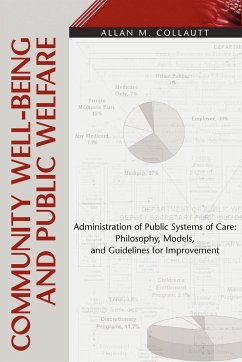The subject of this book is public welfare systems and practical opportunities for their dramatic improvement in the areas of administrative and financial management. The recommended approach is founded on meaningful participation of local communities in many critical decisions toward effective functioning of public systems and measurable outcomes of this functioning from the community perspective. Increased role of local communities and their members is not envisioned on the basis of a weakening coordination and control by governmental authorities. To the contrary, elements of self-administration and active community involvement are expected to make public bureaucracies more effective, when assessed by their constituencies. The author of the book does not profess to be an expert on all systems of public services, especially considering that the term public services itself lacks clarity and may prompt a lengthy discussion. Assuming that the term public services embodies what a government does for its community, it is obvious that it encompasses many fields of activity and many industries. Nevertheless, the author maintains that numerous areas of government involvement toward serving its constituencies have much in common, which warrants an opportunity to design and implement a uniform approach for solving basic administrative and financial management problems. The author holds that the foundation of such universal approach is community participation and community-based philosophy of service delivery. Not all public services systems seem equally requiring improvement or overhaul. Our country appears to be in desperate need for innovative and effective solutions in those areas of government involvement that focus on special populations especially when their memberships are comprised of those who are often called disadvantaged. For such systems of public assistance the recommendations presented in this book should not be seen as a panacea but as a guide and a general direction. If one accepts the tenets of this book, its founding values, and its suggested course of action, one would necessarily realize that each implementation of the recommendations herein would take its own path meandering along the straight line charted by the author.








